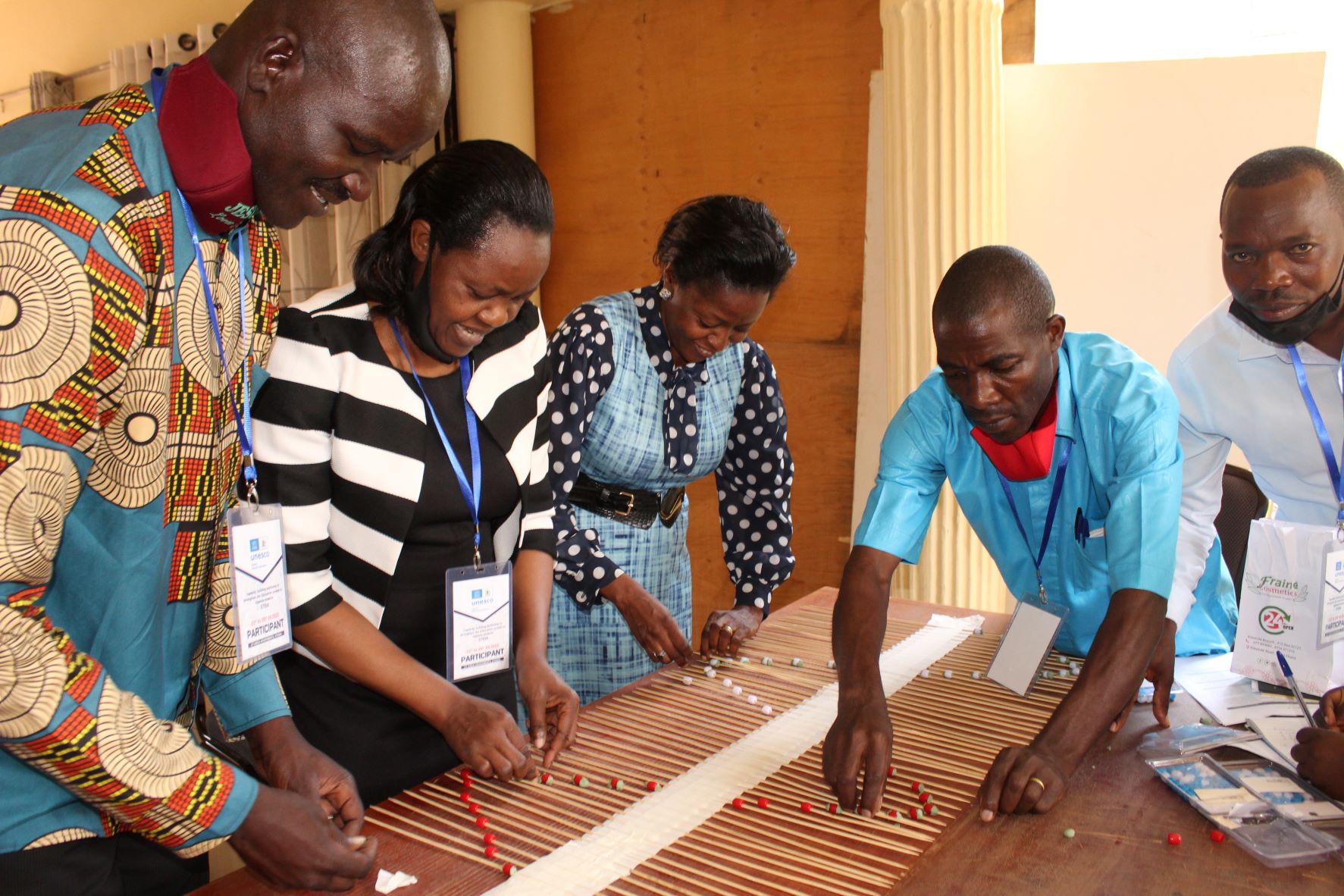Uganda National Commission for UNESCO with support from UNESCO organized and conducted a one-week training workshop to promote Gender Responsive Science Technology Engineering and Mathematics (STEM) Education in Uganda. The workshop took place from 21st-25th March 2022 at Arch Apartments Hotel in Kiwatule and attracted over 50 participants drawn from various parts of Uganda, among them were STEM teachers, school administrators, teacher educators, ministry of Education and Sports officials and representatives from NGO’s
The overall goal of the training was to strengthen the capacity of the education system in the country to provide gender-responsive STEM education and ultimately increase girls’ participation in STEM education. This comes at the back drop that many African countries including Uganda have over the years recorded low participation and academic performance of girls in STEM subjects. Many cross-national learning assessments find that, gender differences in science and mathematics achievement begin at the end of primary education, deepening in secondary education and are accompanied by fewer women than men pursuing these STEM fields in higher education. Recent statistical data shows that in Uganda, only 53% of girls aged 6-12 are reported to complete the required seven years of primary education, and merely 22.5% of the female Ugandan population as a whole enroll in secondary education
The Chairperson, Board of UNATCOM, Prof. Eriabu Lugujjo delivered a key note address and highlighted that some of the challenges faced by schools is high population of students, inadequately equipped laboratories, limited or no technicians to manage the laboratories among others which hinders meaningful teaching and learning of science subjects. However, he applauded UNESCO for always providing schools with some equipment to facilitate teaching and learning of STEM subjects.
“STEM subjects can be done by everybody as long as there is a good beginning and an enabling environment.” Prof. Lugujjo
The Secretary General, UNATCOM Ms. Rosie Agoi informed stakeholders gathered that the training was focused on improving participation and performance of women and girls in Science Technology Engineering and Mathematics Education (STEM). Ms. Agoi noted that,
“Girls are majorly faced with social cultural issues that hinder them from pursuing and participating in STEM education in Uganda, the training is aimed that addressing such issues and see an improvement in participation of girls and women in STEM education in the years to come.” Rosie Agoi SG. UNATCOM
The UNESCO National Projects Coordinator, Mr. Charles Draecabo officiated at the opening ceremony of the STEM training. He underlined the ripple effects of COVID-19 that have widen the gender gap across all aspects of life casting a spotlight on teenage pregnancies and early marriages that have hindered a number of girls from returning to school as a result of COVID-19 related school closure in Uganda. He stated that, “there are critical questions that need to be asked to address the issue of Education for girls, for example how can the number of girls pursuing STEM be increased at all levels?” Mr. Draecabo encouraged participants of the STEM training to brainstorm and find solutions to the challenges hindering girls from pursuing STEM especially at higher levels of Education. He further requested and appealed to all trainers to increase the level of awareness and vigilance in their institutions about the value of STEM education for girls because it is currently lacking.
Mr. Draecabo emphasized the need to demystify the stereotypes that today’s society have labelled against girls as being soft and therefore unable to excel in STEM subjects. He advised that this needs to end.
“Whereas it is the cardinal role of teachers to mentor girls and encouraged them to pursue STEM subjects, it is also their duty to encourage boys to develop positive attitude towards girls in STEM Education.” Mr. Charles Draecabo
The training focused on the situation of STEM education in Africa, gender and STEM education, Institutional leadership for gender responsive STEM education, gender responsive pedagogy, gender responsive teaching and learning resources, integration of digital skills and ICT in the teaching and learning of STEM subjects and an education tour to two schools i.e. Our lady of goof counsel and Rubaga girls to assess the situation of STEM education, all this introduced participants to a whole new approach to teaching and promoting STEM education to learners especially the girls.
Ms. Kedrace Turyagyenda, Director Directorate of Education Standards who was the chief guest representing the Permanent Secretary, MOES at the closing ceremony noted that the training was timely and hoped that science teachers were tickled and challenged to review their teaching practices and was confident that teaching practices are tending towards answering the ‘why’ question teaching and learning processes. She advised the teachers to rethink their work and make it better for betterment of our societies and development of the country.
“Once a teacher is transformed, everything will transform” Ms. Kedrace Turyagyenda, Director Directorate of Education Standards, Ministry of Education and Sports
In conclusion, participants were urged to share the knowledge and skills acquired from the training with their colleagues and other members of their communities in order to the change the mindset of people that science is not a space for girls to thrive and excel.

